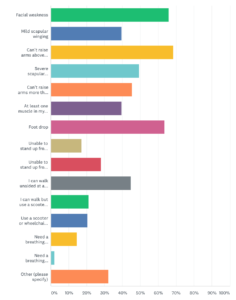 Our Voice of the Patient Forum on drug development for FSHD will take place on April 21st. This landmark event is our community’s platform to testify to the FDA on the impacts FSHD, including the worries that you have about the future for yourself and your loved ones.
Our Voice of the Patient Forum on drug development for FSHD will take place on April 21st. This landmark event is our community’s platform to testify to the FDA on the impacts FSHD, including the worries that you have about the future for yourself and your loved ones.
An important aspect of FSHD is how it affects people’s mood and anxiety. This is a life-long, progressive condition, and as one individual told us, “the worst thing is when you start to go into a downward slide, you don’t know where it will stop.” By sharing your worries about the future in this week’s survey, you will help us understand how best to communicate to the FDA this invisible but very real burden of living with FSHD.
 Thanks to all—more than 550 of you!—who responded to our most recent survey on the symptoms that have greatest impact on people. Some findings that stood out for us:
Thanks to all—more than 550 of you!—who responded to our most recent survey on the symptoms that have greatest impact on people. Some findings that stood out for us:
- Foot drop is among the top three most common symptoms, along with facial weakness and limited arm movement. The term “facioscapulohumeral” truly does not capture a central feature of the condition.
- Hand and finger weakness was mentioned frequently, and yet is often not mentioned in standard medical descriptions of FSHD;
- A majority of you told us that not being able to walk as far, freely, without fatigue or fear of falling, was among the most important impacts of FSHD.
- The difficulty of accessing friends’ homes, shops, and public spaces is making it hard to engage in activities that are important to you.
- Your responses make it abundantly clear that this “mild, slowly progressing muscular dystrophy” is serious and imposes severe burdens.
Did you miss our previous blog posts and surveys? You can find them here:
- Why your voice matters
- Which symptoms have the biggest impact on your life?
Visit our event page for the Voice of the Patient Forum where you can:
- Listen to our recorded webinar and Q&A about the meeting
- Register for the live webcast on April 21
- Register to attend the meeting on April 21 in Hyattsville, Maryland (space is limited).
- Take all five our our pre-meeting surveys.





Wish I could have read the complete question to the left on the bar chart.
The survey system cuts off the labels. here’s what they are in full:
How are you affected? Check all that apply.
a. Facial weakness
b. Mild scapular winging
c. Can’t raise arms above shoulder height
d. Severe scapular winging
e. Can’t raise arms more than 60 degrees from the side of my body
f. At least one muscle in my arm can lift against gravity but not against additional resistance
g. Foot drop
h. Unable to stand up from a chair unless supported on just one side
i. Unable to stand up from a chair unless supported on BOTH sides
j. I can walk unaided at all times but worry about stairs, fatigue, and falling
k. I can walk but use a scooter or wheelchair for distances greater than ~100 yards
l. Use a scooter or wheelchair virtually all the time.
m. Need a breathing assist (such as Bi-Pap) at night
n. Need a breathing assist during the day.
o. Other ___
Getting up is very difficult. I’m 73 and I could do virtually anything until about 60. Started having trouble with stairs and weakness in my hips. Balance has become worrisome. Using walker in house and sliding more and more into a wheelchair. Since turning 70 things have speeded up. My greatest wish is that it would stop progressing so fast or actually go into remission. Dare to dream I guess.